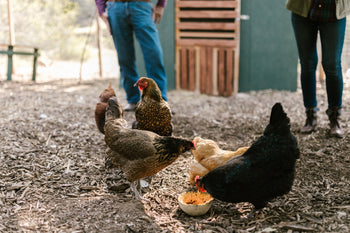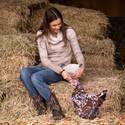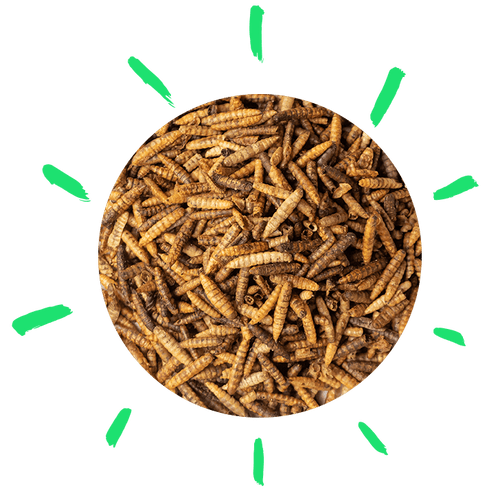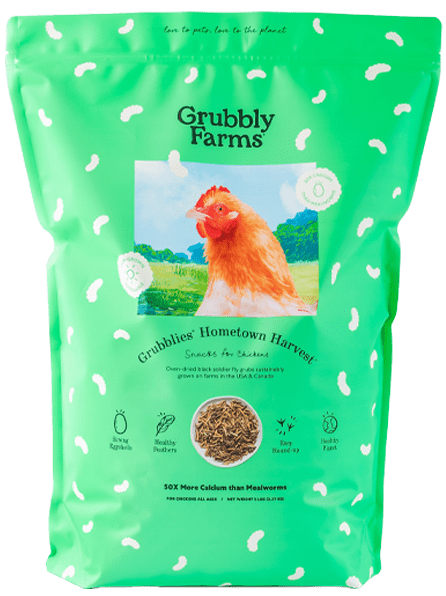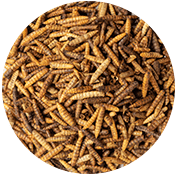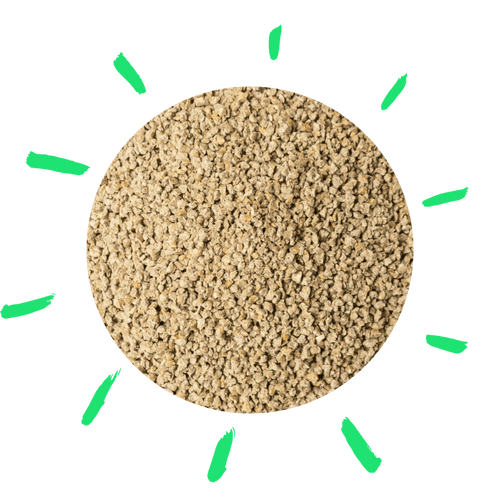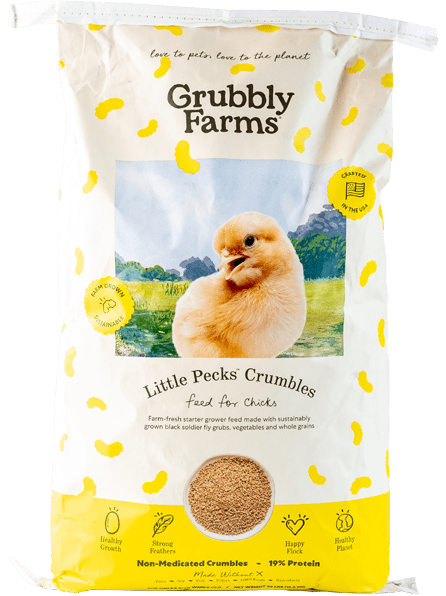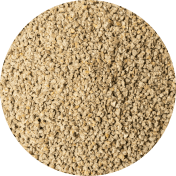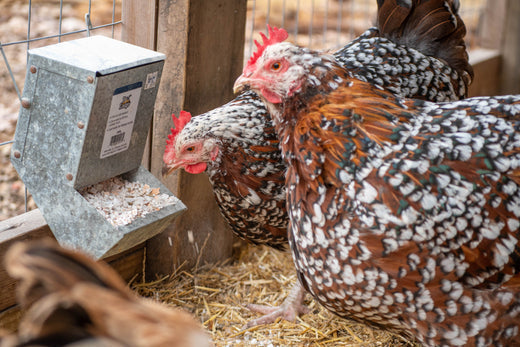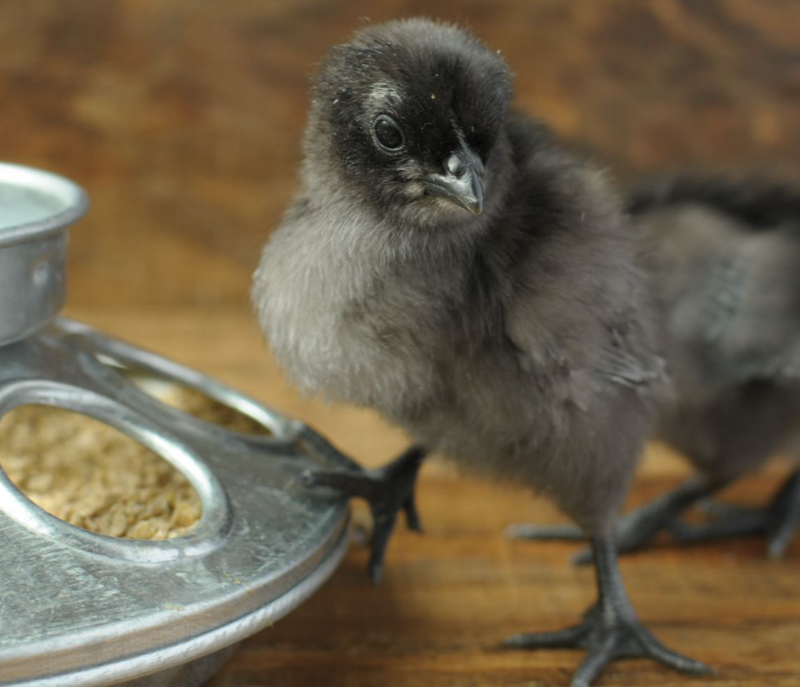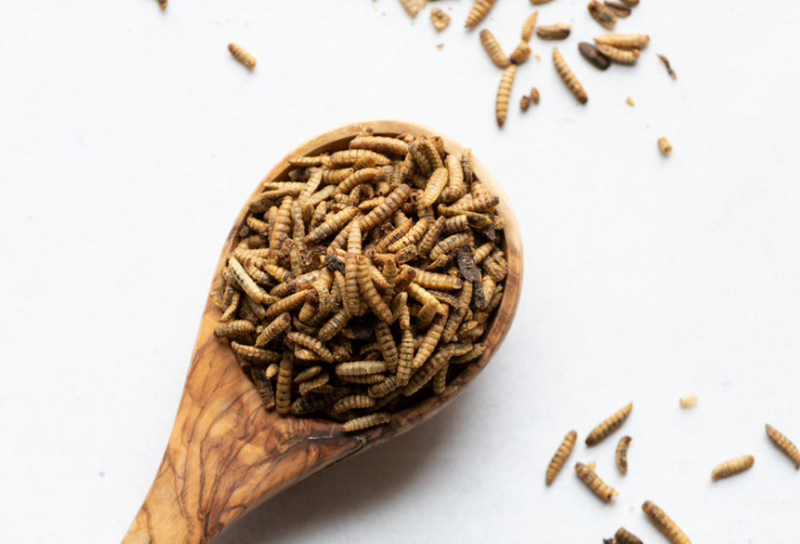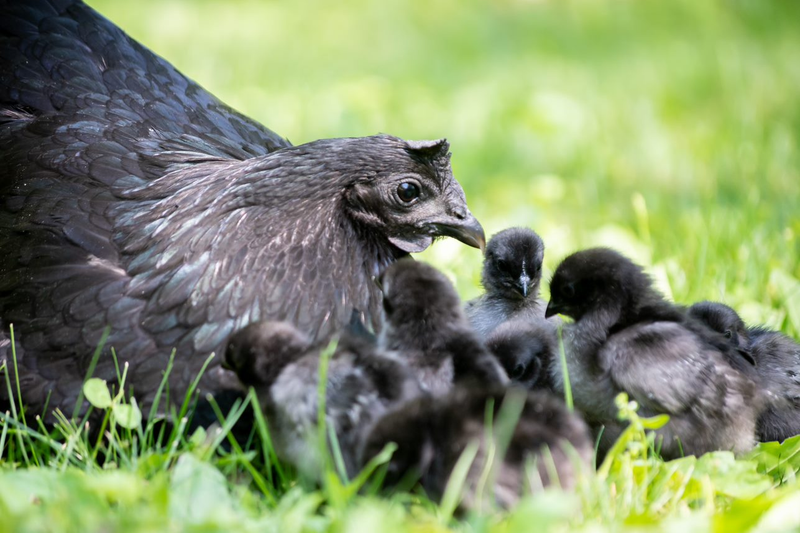As a flock owner, feeding your chickens healthy treats and snacks is a rewarding activity and a great way to enrich your chickens’ lives. However, we’ve all come across those food items that we’re not quite sure are safe for our chickens to eat. Grubbly’s guide to what chickens can and cannot eat is here to help!
Within this guide, you will find the most common (and uncommon) foods that flock owners ask about. We listed them alphabetically to make it easier for you to locate the specific food you have in mind–and for those foods your girls can enjoy, we listed the benefits and any other information you may want to know. So, dive in!

DOWNLOAD THE PRINT-FRIENDLY VERSION
Looking for a specific food within the guide? Use the "FIND" command by pressing CTRL + F, type the name of the food.
What Can Chickens Eat from A to Z?
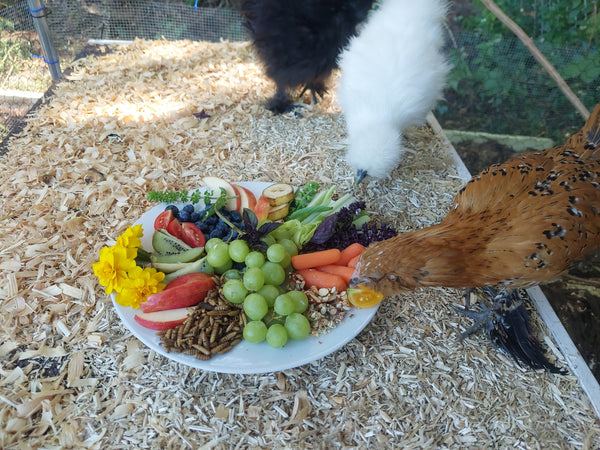
Can Chickens Eat Almonds?
Yes. Chickens can eat almonds and almond butter. Almonds are considered one of the 10 most healthy snacks for chickens
Benefits
- High in protein
- Calcium
- Fiber
- Iron
- Magnesium
- Manganese
- Vitamin D
What Else Should You Know?
Almonds are a great source of protein for laying hens. However, you will want to feed this snack in moderation since too many almonds can cause digestive problems for your girls. Almond butter is a fantastic way to provide a healthy snack that can be spread on apples or even a chicken piñata for added enrichment!
If you have leftover flavored or salted almonds, be sure to rinse the excess salt off.
Can Chickens Eat Apples?

Yes! Chickens can eat the apple’s flesh and skin. They can also eat apple sauce. But remove the seeds stems, and leaves.
Benefits
- Calcium
- Vitamin K
- Potassium
- Vitamin C
- Copper
- Fiber
- Vitamin E
- Vitamin B1
- Antioxidants
- Pectin
What Else Should You Know?
Apple seeds can be toxic to chickens once they come into contact with amygdalin (or digestive juices). Because of your chicken’s unique digestive system, apple seeds will ALWAYS get ground up as they digest, so always avoid feeding them to your girls.
Can Chickens Eat Apricots?
No. It’s best to avoid feeding your chickens apricots or letting them forage beneath the apricot tree since the pits and leaves of this fruit are toxic to chickens.
What Else Should You Know?
Apricots pits and leaves contain cyanogenic glycosides, which can cause seizures, low blood pressure, and breathing issues for chickens. These toxins become more concentrated when a tree is stressed from dry conditions or frost.
Can Chickens Eat Asparagus?
Yes, your flock can enjoy asparagus! Both raw and cooked asparagus provide your girls with a boost of vitamins and minerals.
Benefits
- Fiber
- Vitamin A
- Vitamin C
- Vitamin K
- Vitamin E
- Folate
- Phosphorus
What Else Should You Know?
While asparagus is a yummy vegetable that your chickens will adore, many flock owners report that too much asparagus can give their eggs an off-putting flavor.
Can Chickens Eat Avocado?
Yes and no. The flesh of the avocado is safe for chickens to eat. However, the seeds and skins are toxic. Many flock owners opt to play it safe and skip the risk of feeding their girls avos!
What Else Should You Know?
The toxin founds in avocado pits and skins is called persin. Persin is also found in avocado leaves and stems, so it’s best to keep your girls from grazing around any avocado trees.
Can Chickens Eat Avocado Seeds?
No. Avocado seeds are poisonous to chickens.
Can Chickens Eat Avocado Skins?
No. The skins, leaves, and stems of avocados are toxic to chickens.
Can Chickens Eat Bananas?

Yes, they can! Chickens and bananas are a match made in health heaven! While your girls will flock to the sweet interior of the banana, it’s also safe for them to snack on the peel. To make the peel easier to eat, cut it into bite-sized pieces.
Benefits
- Vitamin A
- Vitamin C
- Vitamin B6
- Magnesium
- Iron
- Niacin
Can Chickens Eat Basil?
Yes, your flock can enjoy basil. Basil is a great addition to your chickens’ diet! It can deepen the color of yolks and supports the respiratory system.
Benefits
- Fiber
- Vitamin A
- Vitamin B1
- Vitamin B2
- Vitamin B3
- Vitamin B5
- Vitamin B6
- Vitamin C
- Vitamin E
- Vitamin K
- Calcium
- Copper
- Magnesium
- Potassium
- Zinc
What Else Should You Know?
Basil makes a fabulous addition to your hens’ nesting boxes. Not only does it smell lovely, but it also has antibacterial properties. When ingested, these properties can boost your chickens’ immune systems. The fiber in basil can prevent constipation, and iron supports heart health.
Can Chickens Eat Bread?
Yes, chickens can eat fresh bread, but they cannot eat moldy bread. Keep in mind that bread has little-to-no nutritional value for chickens and should only be fed to them on occasion. It also helps to break the bread into small pieces to give the crop and gizzard assistance in breaking down the bread.
What Else Should You Know?
Bread is a form of chicken ‘junk food.’ While chickens think it’s delicious, it can cause crop blockages in large amounts.
Can Chickens Eat Beans?
Yes and no. Chickens can eat cooked beans, but they cannot eat raw or dried beans (or lentils).
Benefits
- Antioxidants
- Protein
- Vitamin B1
- Vitamin B2
- Vitamin B3
- Vitamin B5
- Vitamin B6
What Else Should You Know?
Uncooked beans contain phytohaemagglutinin, a toxic compound that can get your chickens quite sick. Uniquely enough, this compound breaks down as beans are cooked. Additionally, once beans sprout, they’re also safe.
Can Chickens Eat Beets?
Absolutely. Chickens and beets are a perfect pair! Your flock can enjoy the beet’s roots, stems, and beet greens (raw or cooked).
Benefits
- Antioxidants
- Natural sugars
- Fiber
- Manganese
- Potassium
- Iron
- Vitamin C
- Vitamin B9 (folate)
What Else Should You Know?
Beets are heart-healthy for chickens and are a hydrating snack. If your flock has a few ducks in the mix, you will want to grate the beetroot to help your quackers eat them.
Can Chickens Eat Bell Peppers?
Yes. Chickens can eat the whole fruit of the bell pepper. However, do not feed your flock the stems, leaves, or flowers. Similarly to tomatoes, these parts of the plant can be toxic to chickens.
Benefits
- Calcium
- Iron
- Magnesium
- Phosphorus
- Potassium
- Zinc
- Vitamin A
- Vitamin E
- Vitamin K
What Else Should You Know?
In addition to bell peppers, chickens also enjoy jalapenos, poblanos, and other pepper varieties. While chickens cannot taste capsaicin (the oil in peppers that makes them spicy), you should limit their pepper intake to prevent digestive issues.
Can Chickens Eat Bird Seed?
Yes, in moderation. Bird seed can be a fun snack for chickens. However, it is not recommended as a full diet for your flock.
What Else Should You Know?
Because chickens lay year-round, as opposed to only a handful of times per year, they need a diet designed to support their egg production. Additionally, bird seed is often high in fat since wild birds have more trouble locating fatty foods, and this can be detrimental to your chickens’ health long-term.
Can Chickens Eat Blackberries?

Yup! Blackberries are a delicious and nutritious treat for chickens. These nutrient-dense berries offer a fun snack that is rich in fiber!
Benefits
- Vitamin A
- Vitamin K
- Fiber
- Manganese
- Antioxidants
Can Chickens Eat Blueberries?

Yup! Chickens will joyfully devour blueberries, and that’s great because these compact little snacks are filled with antioxidants, vitamins, and minerals! Plus, they’re low in calories to help your girls stay fit.
Benefits
- Vitamin C
- Vitamin K
- Fiber
- Antioxidants
What Else Should You Know?
Freezing your blueberries is a great way to keep your flock cool and entertained during the heat of summer. If you grow your own blueberries, you can dehydrate them to keep your girls enjoying the blue goodness all year round!
Can Chickens Eat Broccoli?
Yup! Chickens can eat broccoli raw or cooked. Your girls will even chow down on those stems that are too tough for you to eat, and this veggie is great for your chickens’ immune systems and muscle health.
Benefits
- Low calorie
- Fiber
- Protein
- Calcium
- Vitamin C
- Potassium
- Vitamin K
Can Chickens Eat Brussels Sprouts?
Yes. Brussels sprouts are great for chickens! They can enjoy them raw or cooked, but if you go the raw route, be sure to dice them into bite-sized pieces. They’re great for your girls’ digestive systems and heart health.
Benefits
- Fiber
- Folate
- Vitamin A
- Vitamin K
- Protein
- Manganese
Can Chickens Eat Cabbage?
Yes! Green and red cabbage are an affordable, entertaining, healthy, and delicious snack for your flock. They can enjoy cabbage raw or cooked!
Benefits
- Fiber
- Vitamin A
- Vitamin C
- Folate
- Magnesium
- Potassium
- Vitamin K
What Else Should You Know?
Cabbage can be a great source of enrichment for your gals. Hanging a head of lettuce from the roof of their run can turn any day into a party. This natural piñata provides a boost of vitamins. For maximum nutrients, opt for red cabbage since it's 30% higher in Vitamin C than green cabbage.
Can Chickens Eat Cantaloupe?

Yes. Cantaloupe is a “can”aloupe when it comes to your flock. This sweet snack is refreshing and filled with Vitamin C–the ideal snack for a hot summer day. Your girls can eat the entire melon, including the seeds, but will likely leave the rind.
Benefits
- Hydrating
- Fiber
- Vitamin C
- Vitamin K
- Manganese
- Magnesium
- Folate
What Else Should You Know?
The vitamins naturally found in cantaloupe aid in stress relief, cell health, and reproductive health. This sweet fruit also supports a healthy skeletal system for chicks, a healthy metabolism, and heart health.
Can Chickens Eat Cantaloupe Seeds?
Yes. Chickens can chow down on cantaloupe seeds in moderation. These seeds are ground up without issue by your chickens’ gizzards.
Can Chickens Eat Carrots?

Absolutely, chickens can eat carrots. These colorful and tasty root vegetables are a superfood for your flock! Plus, with dense beta carotene, they’re one of the few nutritious snacks that support your chickens’ eyesight.
Benefits
- Fiber
- Hydration
- Vitamin A
- Vitamin C
- Antioxidants
- Potassium
- Carotenoids
What Else Should You Know?
You can feed your flock raw or cooked carrots. Your gals will appreciate the tops and peels of your carrots, too. If your carrots are store-bought, just be sure to give them a rinse if you’re planning to treat your girls to the peels.
Can Chickens Eat Cat Food?
Yes and no. You’ve likely read that cat food is a great way to boost your chickens’ protein levels, but this is only advised in the short term if recommended by your vet. Your vet may suggest your flock needs the excess protein due to molting or another diagnosed condition. Feeding your chickens cat food in the long term can cause kidney issues and an amino acid deficiency since cat food is formulated for a cat’s essential amino acids (which differ from a chicken’s).
Can Chickens Eat Cauliflower?
Yes, your chickens can eat cauliflower. This low calorie snack offers your girls variety in their diet and some beneficial nutrients.
Benefits
- Antioxidants
- Fiber
- Calcium
- Folic acid
- Iron
- Magnesium
- Phosphorus
- Potassium
- Vitamin B6
- Vitamin C
- Vitamin K
Can Chickens Eat Celery?
Yes! While celery may seem like a bland snack for your flock, this hydrating treat is extremely healthy for them. Your flock can enjoy the leaves, stalks, and roots. Just be sure if you’re feeding them the stalks, that you pare them down to bite-sized bits since the strings can be difficult for them to digest.
Benefits
- Low-calorie
- Fiber
- Vitamin C
- Vitamin K
- Manganese
- Iron
- Potassium
- Zinc
- Magnesium
- Folate
What Else You Should Know?
Hanging the celery root from your girls’ run is a great way to add enrichment to their day. Celery supports nearly every aspect of your flock’s health, from overall organ health to the immune system, celery is a hidden gem for your gals.
Can Chickens Eat Cheese?
Yes, in moderation. Cheese isn’t considered a healthy snack, but your chickens will adore it. However, be mindful that dairy products, like cheese, can give your girls diarrhea.
Can Chickens Eat Cherries?
Sure! Chickens love cherries. Just be mindful of the cherry pits and stems. While the pits and stems do contain tiny amounts of cyanide, they’re technically safe for your girls to eat. However, almost all chickens will avoid eating these parts of the cherry.
Benefits
- Hydrating
- Fiber
- Natural sugars
- Vitamin B6
- Vitamin C
- Vitamin K
- Potassium
- Iron
- Phosphorus
Can Chickens Eat Chocolate?
No way! Chocolate can be fatal for chickens. The presence of theobromine and caffeine makes chocolate extremely dangerous for poultry. If your girls get themselves into a chocolate bar you accidentally left out, contact your vet or the pet poison control center. Keep in mind, that the darker the chocolate, the more caffeine and theobromine.
Can Chickens Eat Cicadas?
Sure. A cicada is like a Thanksgiving Day turkey to chickens. Like other insects, cicadas are a natural part of your girls’ diet and are rich in protein. However, don’t be surprised if you catch one of your hens swallowing a cicada whole. And don’t be concerned. This is pretty normal for a chicken that cannot contain their excitement at such a delectable snack!
Can Chickens Eat Cilantro?
Yes! Chickens enjoy this delightful herb, and they can dine on the leaves and stems. This aromatic herb is a great source of antioxidants and vitamins, too.
Benefits
- Vitamin A
- Vitamin C
- Vitamin K
- Antioxidants
Can Chickens Eat Coffee Grounds?
No. Never feed your chickens coffee grounds. Coffee contains methylxanthine, which is toxic for chickens. Methylxanthine prevents your chickens’ bodies from absorbing calcium and can damage the immune system, heart, and lungs.
Can Chickens Eat Cooked Potatoes?
Yes, chickens can eat cooked potatoes in moderation. Additionally, be mindful of how the potatoes are prepared. If they contain high levels of salt, butter, or sour cream, it’s best to only give your girls a small amount or none at all.
Can Chickens Eat Cooked Rice?
Yes. Your flock can eat leftover cooked brown, yellow, or white rice. The only exception is if your leftover rice is laden with salt or other seasonings. Additionally, while rice is a great source of carbohydrates and some protein, it doesn’t offer a lot of nutritional value beyond that.
Can Chickens Eat Corn?

Yup, your chickens can eat cooked or raw corn. While chicken feeds primarily made up of dent corn may not be the most nutritious, giving your girls fresh or cooked sweet corn from time to time is a great way to provide dietary variety and some vitamins and minerals.
Benefits
- Fiber
- B Vitamins
- Vitamin E
- Vitamin K
What Else Should You Know?
Corn is extremely high in calories (which is why many chicken feed companies use it as the main ingredient in their feeds). This makes corn a great snack for your flock, but not necessarily the best primary diet. Additionally, frozen corn makes a wonderful snack for when temperatures rise. And hanging a cob in your girls’ run can make a fun engagement activity.
Can Chickens Eat Corn Husks?
Yes. If you’re husking corn for your dinner, you can share the husks and silks with your flock! However, if you give your girls the whole cob including husks, they may ignore this less tasty part and opt to just chow down on the kernels.
Can Chickens Eat Corn on the Cob?

Yes. Chickens will peck the kernels off the cob, leaving the cob itself.
Can Chickens Eat Cranberries?
Yes! Cranberries make a fabulous, healthy snack for your chickens. These bright berries are brimming with antioxidants and fiber, and they make a wonderful addition to any winter snack you’re preparing for your girls. And just like for people, cranberries are great for your chickens’ urinary health.
Benefits
- Low in calories
- Fiber
- Low in sugar
- Vitamin C
- Vitamin E
What Else Should You Know?
Uncooked cranberries naturally float. So, if you’re looking for a fun way to keep your flock cool during hot weather, set up a shallow bowl, pour some cranberries in, and watch them bob for these tasty beauties!
Can Chickens Eat Cucumber?

Yes! Cucumbers are a refreshing and hydrating snack that will please your flock’s palate. Most chickens adore the seeds and softer flesh, but some will also chow down on the peels.
Benefits
- Vitamin A
- B Vitamins
- Vitamin C
- Vitamin K
- Fiber
- Hydrating
What Else Should You Know?
Frozen cucumbers are an excellent snack to cool down your flock on those hot and humid days. Plus, you can freeze excess cucumbers to extend their shelf life and provide your girls with wholesome veggies into fall and winter.
Can Chickens Eat Dandelions?
Yes. Dandelions may be a weed in our eyes, but they’re a true treat in the eyes of any chicken.
Benefits
- Fiber
- Calcium
- Vitamin A
- B Vitamins
- Vitamin C
- Vitamin K
What Else Should You Know?
Many flock owners turn their dandelions into a fresh and fun salad for their flock! Simply pull your dandelions, rinse their roots (and leaves if you use any chemicals in your yard), and chop up the entire plant for a vitamin-rich summer snack!
Ducks and geese can even partake in this delicacy–just add water! Float your dandelion in a bowl of water and watch them (and your chickens) go to town.
Can Chickens Eat Dog Food?
Yes and no. Many flock owners use kibble as a snack for their flock without negative effects. However, the quality of ingredients and preservatives in dog food can vary wildly, so be cautious of how much dog food you feed your gals–and never substitute your chickens’ primary feed for dog food. Chickens naturally crave protein from grubs, bugs, worms, and veggies–opting for a healthier snack like Grubblies is a much safer alternative to dog food.
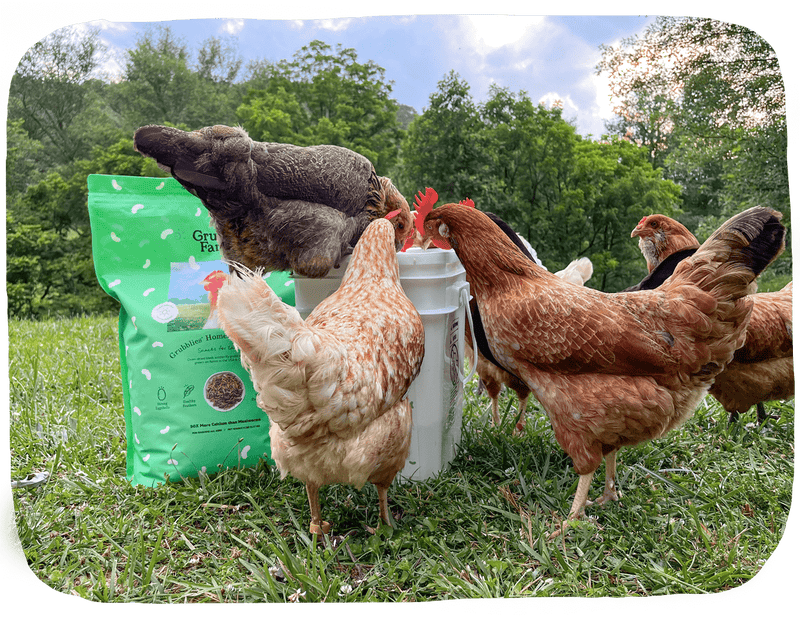
Grubblies
A healthy treat for your flock
With 50x more calcium than mealworms, treat your flock with Grubblies and help support strong eggshells.
Shop NowCan Chickens Eat Eggplant?
Yes! Eggplant or aubergine is a nutritious delicacy for your chickens. This stunning veggie is known to support immune system health and provide plentiful folic acid for egg-laying. Feed your flock cooked or raw eggplant, diced or cut in half for ease of enjoyment!
Avoid feeding your flock eggplant leaves and stems. As a nightshade (like tomatoes), the leaves and stems contain solanine which is toxic to your chickens.
Benefits
- Antioxidants
- Folic acid
- Phosphorous
- Vitamin C
- Potassium
- Vitamin K
- Vitamin B6
- Fiber
- Thiamine
- Niacin
Can Chickens Eat Eggs?
Yup! While egg-eating from the nesting box can be a sign of a calcium deficiency, you can feed your chickens cooked eggs. We recommend if you feed your flock eggs, always opt to put the egg in their feeder or specific dish for snacks–this will discourage them from connecting the eggs you feed them with the eggs they lay.
Raw eggs are safe for chickens to eat. However, feeding your chickens raw eggs can lead to a hard-to-break egg-eating habit.
Benefits
- Protein
- Vitamin A
- B Vitamins
- Vitamin D
- Vitamin E
- Vitamin K
- Calcium
- Folate
- Phosphorus
- Selenium
- Zinc
What Else Should You Know?
Eggs truly are a superfood. They are a great source of nutrients for chickens that need a boost. This can include chickens recovering from sour crop or impacted crop or chickens that are falling behind growth-wise.
Can Chickens Eat Fish?
Yes. Fish can be healthy for your flock. However, it should not be your flock’s primary source of nutrients. Because it’s dense in protein, too much fish can be hard on your chickens’ kidneys. Additionally, some flock owners report that too much fish or fishmeal in feed can result in their eggs adopting a fishy flavor.
Benefits
- Protein
- Omega-3 fatty acids
- Probiotics
What Else Should You Know?
Different fish species provide varying nutritional benefits. However, farm-raised fish has presented many environmental and health issues for chickens.
Can Chickens Eat Flowers?
Yes–for the most part. Most flowers are highly nutritious for your chickens. Marigolds, nasturtium, goldenrod, and buttercups can deepen the coloration of your gals’ yolks. However, flowers from the nightshade family can be toxic for chickens (although most chickens naturally avoid them).
Can Chickens Eat Garlic?
Absolutely. Chickens can eat garlic, and some flock owners feed their chickens garlic as a way to boost their immune systems and the appetites of underweight chickens. Some chicken owners even swear by garlic as a natural remedy when respiratory issues arise in their flocks. There are also various studies on how garlic can reduce the odor in your chickens’ droppings.
However, too much garlic can result in an off-flavor in eggs.
Benefits
- Vitamin B6
- Manganese
- Selenium
- Iron
- Copper
Can Chickens Eat Grapes?

Sure! Grapes are an excellent choice as a healthy, sweet snack for your chickens. The only thing to be cautious of is that your gals don’t try to swallow them whole.
Benefits
- Vitamin A
- Vitamin C
- B Vitamins
- Copper
- Calcium
What Else Should You Know?
Feel free to cut your grapes in half and freeze them for your flock. Float them in a bowl of water–they’re a great way to increase hydration and cool your chickens down during summer.
Can Chickens Eat Green Beans?
Yes, but opt for cooked green beans. Green beans are a healthy and satisfying chicken snack filled with fiber. While a few raw green beans aren’t likely to have a negative effect on your flock, too many can be a concern. This is because raw green beans contain lectin, which can prevent full nutritional uptake in your hens’ systems.
Benefits
- Protein
- Fiber
- Vitamin C
- Vitamin K
- Potassium
- Iron
Can Chickens Eat Green Peppers?
Absolutely. Green, yellow, and red bell peppers are all delicious and healthy snacks for chickens. Like tomatoes, you will want to avoid feeding your flock the leaves and stems, since they contain solanine, a toxin found in nightshades.
Benefits
- Calcium
- Iron
- Magnesium
- Phosphorus
- Potassium
- Zinc
- Vitamin A
- Vitamin E
- Vitamin K
Can Chickens Eat Ham?
Yes, in moderation and if the ham is not laden with sugar or salt. Ultimately, chickens are omnivores, so they can eat meat. However, not all ham is appropriate for your flock. Too much salty ham can cause health issues and dehydration.
Can Chickens Eat Jalapenos?
Yup! Your chickens will happily gobble up jalapenos–and they won’t bat an eye at the spice. Why? Chickens don’t have capsaicin receptors. However, be sure you keep their pepper intake at a reasonable level since capsaicin can still disrupt their digestive systems in excess.
Benefits
- Calcium
- Iron
- Magnesium
- Phosphorus
- Potassium
- Zinc
- Vitamin A
- Vitamin E
- Vitamin K
What Else Should You Know?
Adding a few dried jalapeno pepper seeds to your flock’s feed can deter rodents. While your chickens can’t taste the spice of jalapeno seeds, mice, squirrels, and other rodents sure can! And they don’t like it at all.
Can Chickens Eat Insects?
Yes! Insects, such as black solider fly grubs are a natural part of a chicken's diet. Grubs and bugs are high in protein, amino acids, and other nutrients that support healthy laying, feather growth, and immune system response.
Can Chickens Eat Kale?
Absolutely. Kale is packed with nutrients that can do wonders for your flock’s health. Chickens also really enjoy the flavor of this superfood.
Benefits
- Fiber
- Vitamin C
- Vitamin E
- Vitamin K
- Beta-carotene
- Calcium
- Magnesium
- Potassium
- Antioxidants
Can Chickens Eat Kiwi?
Yes. Kiwis are a great addition to your chicken’s diet. While the peels are harmless, you will likely find your chickens leave the fuzzy skins behind after thoroughly scraping all the flesh from the fruit.
Benefits
- Fiber
- Vitamin C
- Vitamin E
- Antioxidants
Can Chickens Eat Lawn Clippings?

Yes and no. You may have read that grass is an affordable feed alternative for your flock, but this isn’t the whole truth. Chicken love chowing down on grass, and if they’re in a barren run, the addition of some grass clippings can be a great way to let them indulge in their desire for grassy greens.
However, grass clippings in excess can cause crop issues, such as impacted crop. When chickens can free-range their grass, they’re able to nibble it down in bite-size bits, but when provided clippings, the long grass blades can cause blockages. Additionally, if your lawn has been treated with any chemical fertilizers or pesticides, you could accidentally poison your gals with your trimmed grass.
Can Chickens Eat Lemons?
Sure. Chickens can eat almost any citrus in moderation. They also don’t have the same level of sour receptors as we do, so don’t expect your gals to make funny faces while enjoying their lemons. Just keep in mind that lemons are quite acidic, and in excess, they can cause digestive issues.
Can Chickens Eat Lettuce?
They sure can, but only in moderate amounts. Lettuces contain a lot of things that are good for your girls, but most varieties of lettuce contain large amounts of water, which can give members of your flock diarrhea. However, this hydration can help when it’s warm out. Otherwise try to give them varieties that have less water, like iceberg lettuce, and give them leaf lettuce and varieties similar to romaine. Limit adult chickens to ½ cup for large girls and ¼ cup for smaller ladies. It can help with egg-laying and reduce heart disease.
Benefits
- Hydration
- Fiber
- Protein
- Vitamin A
- Vitamin B6
- Vitamin C
- Potassium
- Calcium
- Iron
- Magnesium
Can Chickens Eat Maggots?
Yes! Believe it or not, your girls likely love maggots. While it may seem gross to us, maggots, like other larvae are a natural part of a chicken’s diet. Some flock owners even grow their own or they let girls can find them as they free range.
Benefits
- Protein
- Fat
- Fiber
- Fatty acids
- Amino acids
- Phosphorus
- Zinc
- Iron
- Manganese
Can Chickens Eat Mangoes?
Yup! Mangoes are a fiber-rich snack for chickens. Just be sure to wash them well if you feed them to your chickens or remove the skin.This removes any pesticides and chemicals in the skin that can cause rashes for some chickens.
Benefits
- Copper
- Folate
- Vitamin A
- Vitamin B5
- Vitamin B6
- Vitamin K
- Vitamin E
- Potassium
- Niacin
- Riboflavin
- Magnesium
- Thiamine
- Antioxidants
- Polyphenols
- Amylase
What Else Should You Know?
Chickens find mangoes delicious, and they're easy to digest. They’re rich in natural sugars and good for their heart and digestive tract.
Can Chickens Eat Meat?
Yes. Your little feathered dinosaurs (AKA chickens) can and will eat meat. Just remember to always give them any meat meant for people in moderation and balance it with vegetables along with a complete chicken feed. Avoid feeding them raw meat since it can potentially get them sick, and never feed them meat that has possibly turned.
Benefits
- Protein
- Fat
Can Chickens Eat Mesquite Pods or Mesquite Seeds?
Yup! Chickens can eat mesquite pods as long as you limit their intake to about 5% to 10% of their entire diet. Any more of this can cause intestinal issues, such as blockages since they’re so high in fiber.
Benefits
- Protein
- Sugar
- Fiber
- Lysine
Can Chickens Eat Mint?
Absolutely! Chickens can eat all varieties of mint, so feel free to freshen up your gals’ day with a mint salad as a refreshing and nutritious snack. You will likely find that your gals LOVE the scent of mint added to their dust bath or nesting box.
Benefits
- Vitamins A
- Vitamin B complex
- Vitamin C
- Calcium
- Phosphorus
- Iron
- Manganese
- Potassium
- Protein
- Carbs
- Fiber
What Else Should You Know?
Many flock owners give their chickens mint regularly to aid with digestive system problems, help relieve respiratory problems, and promote better blood circulation. This aromatic herb is also known to relieve stress and inflammation. Mint also has antibacterial properties and many chicken owners swear by its ability to deter mites.
Can Chickens Eat Mushrooms?
Yes, they can eat any that are safe for humans. Keep in mind that chickens may not care for the flavor of fungi, and you should opt to feed them cooked mushrooms when you can. As for wild mushrooms, you will find your gals might taste them from time to time, but will almost always leave any mushrooms alone that could be harmful.
Benefits
- Protein
- Fiber
- Vitamin B6
- Vitamin B12
- Vitamin D
- Vitamin E
- Antioxidants
- Calcium
- Magnesium
- Selenium
What Else Should You Know?
For chickens on the heavier side, mushrooms make a great low-calorie and fat-free snack. They’re also good for your chickens’ digestive health and immune system. Many chicken owners also say that they can improve egg production.
Can Chickens Eat Nuts?

Yes, your chickens can enjoy a healthy handful of nuts as a snack, but they should be shelled and raw. From the “snacks plate” I prepared, my girls chose the nuts first. Chickens can also eat peanuts (which are technically a legume). The exception to this “rule” is acorns. Never feed your chickens acorns–their tannins can cause kidney issues for chickens.
Benefits
- Protein
- Healthy Fat
- Magnesium
- Calcium
- Zinc
- Potassium
What Else Should You Know?
Nuts are a heart-healthy snack for people and poultry! They’re also great for your gals’ joint health.
Can Chickens Eat Oats and Oatmeal?
Absolutely! Chickens simply love oats and oatmeal. When used as a snack, sprinkling oats in your chicken run can offer your flock easy enrichment and reduce unwanted behaviors such as feather pecking. Avoid giving your chickens oatmeal mixes with a lot of sugar or other sweeteners, though.
Benefits
- Protein
- Fiber
- Carbs
- Antioxidants
- Calcium
- Choline
- Copper
- Iron
- Magnesium
- Manganese
- Niacin
- Phosphorus
- Riboflavin
- Thiamine
- Zinc
What Else Should You Know?
Ground oats can help reduce pasty butt in chicks. Oats are also a great addition to your chickens’ winter diet. Many flock owners switch to a feed with whole or ground oats as the temperatures drop.
Can Chickens Eat Okra?
Absolutely. Chickens enjoy okra–cooked or raw. They can fully indulge in this nutritious veggie, including in the stems, pods, leaves, and even the roots. In fact, okra leaves are rich in iron and protein, vitamins A, C, and K. For chicks under 4 weeks, only give them a small amount since okra does contain solanine.
Benefits
- Protein
- Carbs
- Fiber
- Vitamins A
- Vitamin B6
- Vitamin C
- Vitamin K
- Potassium
- Calcium
- Iron
- Magnesium
- Folate
- Thiamine
Can Chickens Eat Onion?
Yes, it’s safe for chickens to eat onions, but they probably won’t be one of your flock’s favorites. Additionally, many flock owners report that onions give their eggs an off-flavor.
Benefits
- Antioxidants
- Fatty acids
- Vitamin C
- Folate
- Vitamin B6
- Potassium
- Anthocyanins
- Quercetin
- Sulfur-compounds
- Thiosulfates
Can Chickens Eat Orange Peels?
Yes. Chickens can eat orange peels in moderate amounts. However, when you give your girls orang slices, you will likely notice that tend to ignore the peels. Orange you glad you asked?
Can Chickens Eat Oranges?

Sure! In moderate amounts, oranges are a delicious and nutritious snack for your flock. While some chickens don’t love the flavor, most have a blast pecking at the pulp. Just be sure you don’t feed them this snack more than twice per week–the citric acid can be a bit harsh on their systems.
Benefits
- Fiber
- Potassium
- Vitamin C
- Calcium
- Phosphorus
- Pectin (helps the digestive tract)
Can Chickens Eat Papaya?
Yup! Chickens just love papaya! And this mildly sweet fruit is one of the healthiest snacks you can provide your gals. We do recommend waiting until your chicks are about 12 weeks old before they dive into this super-fruit, though.
Benefits
- Carbs
- Fiber
- Protein
- Vitamins A
- Vitamin C
What Else Should You Know?
Papaya has been used for centuries as a natural way to help control parasitic worms in poultry. It also has remarkable antibacterial, antifungal, and antiviral properties.
Can Chickens Eat Parsley?
Yes! Your chickens can eat parsley. This wonderful green garnish is actually a wonderful snack to add to your gals’ diet. Many flock owners even swear by it as a laying stimulant.
Benefits
- Vitamin A
- Vitamin B
- Vitamin C
- Vitamin E
- Vitamin K
- Calcium
- Iron
- Magnesium
- Selenium
- Zinc
Can Chickens Eat Peaches?
Absolutely, your chickens can enjoy this juicy, bright, fruit! The natural sugars and fiber in fresh or frozen peaches will leave your girls feeling positively peachy. Of course, your flock shouldn’t eat the pit, so remove it before serving your gals this Georgia staple.
Benefits
- Vitamin C
- Collagen
- Potassium
- Fiber
- Carbohydrates
- Natural Sugars
Can Chickens Eat Peanut Butter?
Yes. Your chickens can enjoy crunchy or smooth peanut butter in moderation. Just be mindful of peanut butter has high sugar content. This mouth-watering snack is a great way to boost protein during molting season.
Benefits
- Vitamin A
- Vitamin C
- Vitamin D
- Vitamin E
- Vitamin K
- Calcium
- Iron Magnesium
- Phosphorus
- Potassium
- Sodium
- Zinc
- Copper
- Manganese
- Selenium
Can Chickens Eat Peanuts?
Sure! Peanuts are safe and healthy for chickens. Just avoid feeding them heavily salted or sweetened peanuts. Peanuts are a great addition to your chickens’ fall and winter diet. They’re naturally rich in healthy fats, carbs, and protein.
Benefits
- Vitamin A
- Vitamin C
- Vitamin D
- Vitamin E
- Vitamin K
- Calcium
- Iron Magnesium
- Phosphorus
- Potassium
- Sodium
- Zinc
- Copper
- Manganese
- Selenium
Can Chickens Eat Pears?
Sure! Chicken + pears are a pair made in poultry paradise. Pears are nutrient-dense and can even help with egg production. The skin and flesh are safe but remove the seeds before feeding your flock any pears–like apples, pear seeds contain a small amount of cyanide.
Benefits
- Hydration
- Vitamin A
- Vitamin C
- Vitamin L
- Calcium
- Antioxidants
- Flavonoids
- Fiber
- Potassium
Can Chickens Eat Peas?
Yes, peas! Peas are safe for chickens, and they’re a fun snack. Feel free to feed your flock cooked, raw, or frozen peas. These bite-sized beauties are a great source of protein to support feather regrowth after molting season.
Benefits
- Vitamin A
- Vitamin B
- Vitamin C
- Vitamin K
- Protein
- Calcium
- Iron
- Magnesium
- Potassium
- Selenium
What Else Should You Know?
When shopping your flock’s chicken feed, opt for a recipe that uses peas instead of soybeans. Peas have a higher digestibility at 63% to 75%, and soybeans tend to be GMOs and can have a negative effect on the environment.
Can Chickens Eat Peppers?

Sure! Chickens can eat pepper flesh and seeds, but it’s not safe to feed them the stems, leaves, or flowers. These parts of the plant can be toxic to chickens. Also, keep your hens’ pepper intake at a moderate level. While they cannot taste the spice, the capsaicin in the peppers can be difficult on their digestive systems.
Benefits
- Calcium
- Iron
- Magnesium
- Phosphorus
- Potassium
- Zinc
- Vitamin A
- Vitamin E
- Vitamin K
Can Chickens Eat Pickles?
Yes, in moderation. All of the elements (cucumber, dill, vinegar, salt, and sometimes sugar) are safe for chickens. However, because pickles can be high in sodium or sugar, it’s best to limit how many pickles your girls are allowed to indulge in weekly. Use your discretion when it comes to sugar and salt levels.
Can Chickens Eat Pineapple?
Yes. Pineapple is perfectly safe for your chickens. You will find they like the same parts we do, but they’ll be happy to clean out the underside of the skin and eat all the way to the core. When treating your girls to pineapple, remember that moderation is best. The acidic nature of pineapple can be a bit difficult for them to digest if given too much.
Benefits
- Fiber
- Vitamin C
- Bromelain (an enzyme that aids in digestion)
Can Chickens Eat Plums?
Sure! Chickens can eat plums (and prunes) as a healthy and nutritious snack. Avoid giving your flock the plum pits since they contain cyanide.
Benefits
- Vitamin A
- Vitamin K
- Sorbitol
- Potassium
- Calcium
- Folate
Can Chickens Eat Pomegranate?
Yes! Pomegranates are a superfood for people and poultry! Chickens can consume pomegranate seeds, flesh, and skins. Pomegranates are a rich and tasty source of antioxidants and beneficial bacteria that aids in digestion.
Benefits
- Vitamin A
- Vitamin B9 (folate)
- Vitamin C
- Vitamin C
- Vitamin E
- Vitamin K
- Potassium
- Omega fatty acids
- Antioxidants
Can Chickens Eat Popcorn?
Yes, your chickens can eat unsalted, unsweetened popcorn. However, you should be cautious when feeding your flock popcorn kernels. These can be difficult for chickens to break down in digestion.
Can Chickens Eat Potato?
Yes. Your flock can safely enjoy raw or cooked potatoes in moderation as long as they haven’t turned green. They will also happily eat your excess potato peels! While potatoes don’t have the same nutritional density as other snack alternatives, they’re not dangerous.
Can Chickens Eat Potato Peels/Potato Skins?
Yes, potato skin or potato peels are safe for chickens to eat. Just be sure they aren’t green or growing eyes. Once potato peels turn green, they’re no longer safe for your gals.
Can Chickens Eat Pumpkin?
Sure! Pumpkins are bursting with nutrition! Pumpkin flesh and seeds are a gold mine of fiber, vitamins, and minerals for chickens. If you’re looking to donate a retired jack-o-lantern to your flock, just be sure to scrape out any wax and cut off any soft or discolored areas.
Benefits
- Vitamin E
- Thiamine
- Niacin
- Vitamin B6
- Iron
- Zinc
- Protein
- Healthy Fats
Can Chickens Eat Pumpkin Guts and Pumpkin Seeds?
Yes! Pumpkin guts, including the seeds and all, are a delicacy for chickens! This fiber-packed part of the pumpkin is a great source of protein and zinc!
Benefits
- Iron
- Zinc
- Protein
- Healthy Fats
Can Chickens Eat Radishes?
Absolutely! You will become your chickens’ favorite person in the world if you bring them radishes or radish greens. Radishes are heart-healthy and a great way for your girls to hydrate. If you really want to spoil your girls, you can grate or chop the radishes to make them easier for your girls to eat.
Benefits
- Riboflavin
- Potassium folate
- Calcium
- Niacin
- Magnesium
- Vitamin B6
- Copper
- Vitamin K
- Manganese
- Phosphorus
- Zinc
Can Chickens Eat Raisins?
Yes, your chickens can eat raisins. Raisins are a favorite snack among chickens. Just keep in mind these antioxidant-packed snacks are best served in moderation.
Benefits
- Vitamin C
- Vitamin K
- Fiber
- Natural sugars
- Calcium
- Potassium
Can Chickens Eat Raspberries?

Sure! Your flock will dance with joy if you share some raspberries with them. These sweet berries are fun for your gals to tear apart, and they’re a healthy source of protein and calcium.
Benefits
- Vitamin C
- Protein
- Calcium
- Fiber
- Ellagic acid
- Quercetin
- Antioxidants
Can Chickens Eat Raw Asparagus?
Yes, your chickens can chow down on freshly picked asparagus. In fact, these lovely green stalks are a great way to give your chickens a boost of fiber and vitamins.
Benefits
- Fiber
- Vitamin A
- Vitamin C
- Vitamin K
- Vitamin E
- Folate
- Phosphorus
Can Chickens Eat Raw Potatoes?
Yes, with caution! Potatoes should not be more than one-tenth of your chickens’ diet, otherwise toxic solanine can build up in their bodies. Steer clear of green peels, skins, and eyes which contain the highest amount of toxins. If you’re still unsure, just avoid white, red, and yellow potatoes, but go wild with sweet potatoes which are perfectly safe and nutritious!
Benefits
- Fiber
- Potassium
- Iron
- Zinc
- Vitamin B6
- Vitamin C
- Alpha Lipoic Acid
Can Chickens Eat Rhubarb?
No. The leaves contain oxalates that can be harmful or fatal to chickens. That applies to both raw and cooked rhubarb. Chickens CAN eat the stalks in moderation, but always keep your girls away from the garden or compost pile if you have rhubarb in it, and avoid feeding them the leaves at all costs. We often tell people you're better off avoiding giving rhubarb to your flock--just in case.
Can Chickens Eat Rice?
Yes. Cooked or un-cooked rice of any variety is safe for chickens. Forget the old myths about birds and raw rice. Uncooked rice is completely fine, although cooked rice is easier for baby chicks to digest. Rice of any kind is a great source of vitamins, but it’s almost pure carbohydrate and no protein so it should be a small part of a diverse diet.
Benefits
- Thiamine
- Vitamin B6
- Magnesium
- Selenium (important for egg production)
Can Chickens Eat Shrimp?
Yes! Let your ladies feast on shrimp as a fancy snack. Raw, dried, cooked, or fried--shell, tail, head. All of the shrimp, all of the ways, can be a nutritious and enjoyable snack for the girls. Just try to avoid feeding them a lot of heavily seasoned shrimp.
Benefits
- Omega-3
- Omega-6
- Iodine
- Calcium (in the shell)
- Vitamin B12
- Antioxidants
- Selenium
Can Chickens Eat Spinach?
Yes. All parts of spinach, raw or cooked, make a great snack for your flock. According to the RSPCA, it’s one of the best vegetables to feed backyard chickens. Stick to no more than a small handful of spinach once a week for each chicken to avoid causing a calcium deficiency in your hens from oxalate buildup.
Benefits
- Carotenoids
- Folate
- Iron
- Magnesium
- Manganese
- Potassium
- Zinc
- Choline
- Vitamin A
- Vitamins B1, B2, B6
- Folic Acid
- Vitamin E
- Vitamin K
Can Chickens Eat Squash?
Yes. Chickens can eat all of the squash they want, including the seeds and skin. If you’re feeding it to them raw, it’s best to cut the squash open if the skin is very hard such as with butternut squash. Along with a balanced diet, squash has many nutritional benefits. The seeds alone are full of vitamin E, crude protein, and B vitamins.
Benefits
- Vitamin C
- Vitamin K
- Iron
- Magnesium
- Manganese
- Phosphorus
- Potassium
Can Chickens Eat Strawberries?
Yes. We’re berry sure your girls will adore you if you are willing to share your strawberries with them! Just remember to rinse your berries before your girls dive in (unless they’re homegrown without exposure to herbicides or pesticides).
Benefits
- Protein
- Vitamin C
- Vitamin B9
What Else Should You Know?
Frozen strawberries are a cooling, hydrating snack that can help your chickens cool down as temperatures rise.
Can Chickens Eat Strawberry Tops?
Yes and no. Your chickens will prefer eating the strawberry flesh, and most will peck away at an remaining flesh on the tops, leaving the greens alone.
Can Chickens Eat Sunflower Seeds?
Yes! Sunflower seeds are a safe and highly nutritious snack that will light up your flock with excitement. Sunflowers offer abundant amino acids, methionine, Vitamin E, and other highly beneficial nutrients. You do not need to dehull or shell the sunflower seeds before feeding them to your flock–your chickens’ gizzards will easily grind up the hull and the inner nut as they digest.
You do want to avoid giving your girls flavored or heavily salted sunflower seeds, though.
Benefits
- Vitamin E
- Protein
- Healthy oil
- Antioxidants
What Else Should You Know?
You can feed your chicken black sunflower seeds or striped seeds. Black seeds have nearly twice the healthy oils as their striped cousins, which is why you often find them in wild birdseed mixes.
Can Chickens Eat Sweet Potato?
Yes! Sweet potatoes are a chicken superfood! They’ll give your girls a natural boost of energy, fiber, and protein. Your flock can enjoy them raw or cooked. They can even dig into the skin (as long as they haven’t turned green). Chopping or dicing raw sweet potatoes makes them easier for your girls to eat.
Benefits
- Fiber
- Vitamin A
- Vitamin B6
- Vitamin C
- Vitamin K
- Manganese
- Potassium
- Healthy carbohydrates
Can Chickens Eat Tomatoes?

Yes. Chickens can safely eat the tomato flesh. Tomatoes are extremely nutritious for chickens. They’re a natural source of potassium, other minerals, vitamins, and antioxidants. Just avoid feeding your flock tomato leaves and stems. As part of the nightshade family, tomato leaves and stems, these parts of the plant contain solanine, which is toxic for chickens.
Benefits
- Vitamin C
- Vitamin K
- Vitamin K1
- Fiber
- Antioxidants
- Potassium
What Else Should You Know?
Tomatoes make for a fun but messy natural enrichment activity. Just push a string through the fruit and hang it within striking distance of your chickens–they will go to town pecking at the swinging treat!
In addition to being a blast for your chickens, as a rich source of potassium, tomatoes have a naturally cooling effect on chickens.
Can Chickens Eat Uncooked Rice?
Yes. Uncooked rice is perfectly safe for your adult chickens to eat. Chicks can struggle to digest uncooked rice, though.
Benefits
- Thiamine
- Vitamin B6
- Magnesium
- Selenium
Can Chickens Eat Walnuts?
Yes. Chickens go nuts for walnuts! And, lucky for them, walnuts are quite healthy for them in addition to being delicious. Walnuts are a great natural source of protein, healthy fat, fiber, and various vitamins and minerals. Crushing or chopping the walnuts can make them easier for your flock to enjoy.
Benefits
- Protein
- Healthy fat
- Fiber
- Vitamin A
- B Vitamins
- Vitamin E
- Vitamin K
- Zinc
- Selenium
- Potassium
- Sodium
- Calcium
Can Chickens Eat Watermelon?

Absolutely! Watermelon is by far one of the best summer snacks for flocks. This hydrating fruit is both nutritious and delicious. Many flock owners freeze watermelon (which has natural electrolytes) to help keep their chickens cool and hydrated during dry spells and high temperatures. Your gals will even enjoy munching on the seeds. As for the rinds, they’re perfectly safe, as well. Just be sure to come back to pick up the skins since your girls will peck down to the skin, and leave the rest.
Benefits
- Hydrating
- Antioxidants
- Lycopene
- Vitamin C
- Protein
- Potassium
- Electrolytes
Can Chickens Eat Watermelon Rind?
Sure! Your chickens will eat as much of the watermelon flesh as they can, including the majority of the rind. Believe it or not, the rind is one of the most nutritious parts of the fruit, having more L-citrulline (an amino acid) than the flesh and seeds.
Can Chickens Eat Whole Corn?
Yes and no. Chickens can eat cooked or raw corn on the cob, but they will choose to leave the cob behind. Keep in mind that dent corn has little nutritious value. Sweet corn is a much healthier option that is rich in fiber, minerals, and vitamins.
Benefits
- Fiber
- B Vitamins
- Vitamin E
- Vitamin K
Can Chickens Eat Yogurt?
Yes. Your flock can indulge in plain yogurt in moderation. This snack is rich in protein, vitamins, minerals, and probiotics. Greek yogurt offers the best nutrition (and can be frozen for a cold snack on hot days).
Benefits
- Protein
- Fats
- Calcium
- Probiotics
- Magnesium
- Potassium
- Zinc
- Phosphorus
Can Chickens Eat Zucchini?
Yes! Zucchini, from flesh to seeds, is a great snack that chickens love. So, if you find a giant zucchini hidden in your garden, there’s no need to let it go to waste--your gals will happily chow down on it. As for health benefits, many flock owners believe zucchini seeds act as a natural dewormer. Plus, these fruits are rich in fiber, vitamins, and minerals.
Benefits
- Fiber
- Protein
- Vitamin C
- Vitamin K
- Potassium
- Magnesium
- Phosphorus
What Can Chickens Not Eat?

Chickens can eat a wide variety of foods, and many of their favorites are the same as ours. This is why backyard chickens are beloved by those who despise waste. Additionally, chickens are also fabulous at self-selecting the foods they need to keep a balanced diet and that are safe for them. This natural instinct to eat a balanced diet is why hens are able to regulate their calcium intake through free-choice oyster shells.
However, not all chickens are the same–and some may go rogue and chow down on food that isn’t safe for them. Making things a little more complicated, the excitement of snack time can throw off a chicken’s instinct to self-regulate its diet. So, to make things easier and keep your chickens safe, you will want to avoid feeding them any of the following foods:
1. Salty or Sweetened Snacks or Scraps
It can be tempting to treat your flock to leftover kettle corn or even french fries but do not give in to the temptation. These junk foods simply aren’t healthy for your chickens. This includes:
- Potato chips
- Candy
- Baked good like donuts or bagels
- Candy-coated nuts
- Salted nuts
2. Moldy Food
We’ve all come across that piece of bread with a few green spots and wondered if we could feed it to our chickens to prevent waste. And the answer is a resounding “No!” Mold produces mycotoxins that are dangerous for chickens, resulting in an illness called, “mycotoxicosis.” Mycotoxicosis comes with a wide range of symptoms, including diarrhea and reduced egg production. In serious cases, it can be fatal or cause permanent paralysis.
So, when it comes to mold, it's always better to err on the side of caution and keep any moldy fruits or foods out of reach of your flock.
3. Avocado Skin & Pit
If you’re considering tossing your chickens the leftover pit or skins from an avocado, aim for the compost bin, instead. While an avocado pit would be a major undertaking for any chicken, the size isn’t the only reason to avoid giving one to your girls. Avocado pits and skins contain persin, which is toxic to chickens.
Persin poisoning can result in respiratory difficulty, an increased heart rate, lethargy, and plumage loss. In severe cases, persin poisoning can cause fatality within 12 hours.
4. Green Potato Peels
You will likely find a few sources that say to never feed your chickens raw potatoes. Why? There is a major risk to feeding them green potato peels. While fresh potato skins are harmless, greening potatoes have very high levels of solanine. Solanine is toxic for chickens, causing vomiting diarrhea and death in severe cases.
5. Chocolate
Chickens and chocolate are a losing combination. Like so many other pets, cocoa can be fatal for chickens, and it’s considered one of the most toxic foods for flocks. Chocolate contains theobromine and caffeine. Both of these stimulants can increase a chicken’s heart, cause dehydration, and cause kidney failure or even seizures.
6. Uncooked Beans
Raw beans contain phytohemagglutinin, which breaks down in the cooking process. This chemical is highly toxic to chickens. Even as few as three uncooked beans can be fatal to a chicken. Making things even more frightening, phytohemagglutinin toxicity can result in death in less than an hour.
7. Nightshade Stems & Leaves (Tomatoes, Peppers, and Eggplants)
Chickens love tomatoes and peppers, and lucky for them, the flesh of these nightshade fruits is perfectly healthy. However, the leaves and stems of these plants contain solanine, which is toxic for your gals, even in moderate amounts. It’s best to remove stems and leaves before feeding any of these to your flock. Although, most chickens will naturally leave these parts of the plant alone.
8. Peach Seeds, Pear Seeds, Plum Pits, Cherry Pits, Nectarines Pits, & Apple Seeds
All of these fruits have seeds or pits that contain small amounts of cyanide. Cyanide is highly fatal and can result in death for chicken within 15 to 30 minutes. Chickens that eat a large number of seeds require immediate medical care. As for stone fruit pits, the cyanide becomes more dangerous when crushed or ground up. It’s best to avoid feeding your flock any whole:
- Apples
- Peaches
- Pears
- Plums
- Apricots
- Nectarines
- Cherries
Other plants that contain cyanide and shouldn’t be fed to chickens include:
- Elderberry
- Toyon
- Columbine
- White clover
- Arrowgrass
- Almond tree (leaves & bark)
9. Raw Meat
Chickens are far from being vegans, or even vegetarians. However, raw meat isn’t the safest food to feed your flock (despite chickens’ reputation for being mini dinosaurs). Why? Raw meat can contain harmful bacteria and toxins that can cause food poisoning for your gals. However, if your girls eat some fresh, raw meat, it's not likely to cause any harm.
10. Coffee Grounds
Like chocolate or cocoa beans, coffee bean and grounds contain theobromine and caffeine, which are highly toxic for flocks. So, skip giving your gals your used coffee grounds and put them directly into your compost bin.
11. Rhubarb Leaves
Rhubarb can be both beautiful and delicious. This ingredient can be the secret to the perfect pie, but its leaves are a hidden toxin lurking in the garden when it comes to chickens. Rhubarb leaves contain oxalic acid, which causes soft shells in small amounts. However, in larger volumes, oxalic acid causes diarrhea and more serious health effects.
If you have rhubarb growing in your garden, we recommend fencing it off, so you girls don’t have access to it.
Benefits of Vitamins, Minerals, & Other Nutrients

When it comes to flock nutrition, understanding how each nutrient affects their health is essential. These guidelines apply to mixed flocks, including chickens, ducks, turkeys, and geese. Our guide to nutritional deficiencies can also help you troubleshoot issues you may notice in your birds.
Vitamin A (retinol)
This vitamin is a powerhouse of health for birds. It is an essential nutrient in your chickens’ or other birds’ diets.
Vitamin A is necessary for:
- Normal growth
- Reproductive health
- Digestion
- Respiratory health
- Proper immune system function
Vitamin A also helps with
- Stress response
- Heat stress response
- Respiratory issues
Vitamin A prevents croup, which often presents as an eye issue and can cause respiratory issues related to the mucus membranes.
Best Snacks for Vitamin A
- Cantaloupe
- Carrots
- Pumpkin
- Kale
- Broccoli
- Dandelion Greens
- Swiss Chard
- Mint
- Coriander
B Vitamins
B Vitamins are required for nearly every bodily function of your flock members. From digestion to cell production, these vitamins work hard to keep your chickens healthy.
Thiamine (Vitamin B1)
Vitamin B1 is essential for the body’s ability to turn carbohydrates into usable energy. It’s also necessary for proper growth and development. It aids in
- Stress response & the immune system
- The brain-muscle connection
- Digestion
- Heart function
Thiamine deficiencies are rare in chickens. Adult laying hens need between 2.5-3 mg/kg of thiamine daily. Chicks and pullets up to 20 weeks old need 2-2.5 mg/kg.
Best Snacks for Thiamine
- Yeast extract
- Rice Bran
- Wheat Germ
- Flaxseed
Niacin (Vitamin B3)
This vitamin is a must for your chickens’ metabolism. Its main role is to aid cell repair and antioxidative health. As the names suggest, niacin is the main component in nicotinamide adenine dinucleotide (NAD) and nicotinamide adenine dinucleotide phosphate (NADP), the two most important coenzymes in cells.
Niacin is found in the amino acid, tryptophan.
Best Snacks with Niacin
- Hops
- Oats
- Rice Bran
- Yeast Extract
Pyridoxdine (Vitamin B6)
Vitamin B6 allows the body to create neurotransmitters–these transport messages from cell to cell. It’s no wonder that Vitamin B6 is vital for proper brain function and hormone production, including those hormones that regulate the inner clock and mood.
Best Snack for Vitamin B6
- Most vegetables
- Whole grains
- Nuts
Cyanocobalamin (Vitamin B12)
Vitamin B12 allows your chickens to metabolize nucleic acids, proteins, carbohydrates, and fat. This vitamin allows the body to create DNA as well as red blood cells. It’s no surprise that this hard-working vitamin is vital for heart health, immune function, and mood regulation.
Best Snacks for Vitamin B12
Vitamin C (ascorbic acid)
Your chickens and other flock members can actually make their own Vitamin C. So, you do not need to supplement their diet with extra. However, Vitamin C-rich snacks are often still very healthy for your flock, especially during times of stress or high temperatures.
Vitamin C
- Aids chickens in their ability to handle stress
- Improves how the body responds to heat and heat stress by combating secondary health issues
- Protect cells against oxidative damage
- Support the immune system
Vitamin C also works in combination with other antioxidants, such as Vitamin E. Citrus in moderation is an excellent source of q1Vitamin C.
Vitamin D
Vitamin D is one of the most important nutrients for egg and eggshell quality since it regulates calcium homeostasis. It is also vital for bone health and preventing rickets in chickens. Chickens can increase their Vitamin D intake through their diets or through exposure to sunlight.
While it may seem that more is better when it comes to Vitamin D, this isn’t always the case. Too much vitamin D can result in excess calcium. If your hens lay eggs with small pimple-like bumps, they are receiving too much vitamin D3.
Best Snacks for Vitamin D
- Grubblies
- Egg yolks
Vitamin E
Vitamin E supports your chickens’ reproductive systems along with their nervous system, immune system, muscular system, and circulatory system.
Chickens that do not receive enough Vitamin E can develop permanent damage to their brain tissues, a loose hanging crop, bowed legs, and muscular dystrophy.
Snacks with Vitamin E
- Sunflower seeds
- Almonds
- Pumpkin
- Greens
Vitamin K
Vitamin K plays a vital role in blood clotting and bone health. Without enough Vitamin K, your chickens will produce eggs with blood spots. They can also experience excessive bleeding from minor injuries.
Best Snacks for Vitamin K
- Greens of nearly any type (turnip, spinach, mustard, collard)
- Cabbage
- Asparagus
- Broccoli
Keep in mind that frozen greens will have less Vitamin K than fresh greens. Additionally, foraging is a great way to give your girls access to Vitamin-K-rich roughage.
Sorbitol
Sorbitol is a type of natural sugar that supports healthy growth and energy availability. Sorbitol offers longer-lasting energy than fructose or glucose forms of sugars.
Snacks with Sorbitol
- Berries (blackberries, raspberries, strawberries)
- Apples
- Apricots
- Avocados
- Cherries
- Peaches
- Plums
Potassium
Potassium is an essential mineral that does a lot of work for laying hens. It improves egg quality and egg production while helping your flock members better regulate body heat–a must during hot weather. Potassium actually encourages your chickens to drink more, which can provide them with much-needed hydration during the summer months.
Snacks with Potassium
- Sunflower seeds
- Almonds
- Apricots
- Bananas
- Spinach
- Lima beans
Calcium
Calcium is one of the minerals you likely hear most about in relation to your chickens, ducks, and other laying poultry. Why? This essential mineral is necessary to lay eggs. However, it is also needed in the formation of bones as chicks become chickens, as well as, your chickens’ nervous systems, circulatory systems, and digestive systems.
It’s important to note that calcium works in harmony with other minerals to keep your flock healthy. These combinations include calcium, phosphorous, and magnesium for cell health.
Always provide your flock with a free choice feeder with crushed oyster shells.
Best Snacks for Choline
- Grubblies
- Eggshells
- Yogurt
Choline
This vitamin-like nutrient is essential for a hen’s health. Choline is a building block for building and maintaining the cell structure. It’s also responsible for nerve function and the liver’s ability to metabolize fat.
Best Snacks for Choline
- Egg yolk
- Cereal germ
- Legumes (like peas)
Phosphorus
Phosphorus is essential for chicks’ growth and skeletal development. As for laying chickens and other birds, phosphorus aids in skeletal maintenance and soft tissue support as they produce eggs. And, not surprisingly, phosphorus is necessary for healthy egg production. In fact, phosphorus is needed for poultry to metabolize calcium. If your hens are laying soft eggs, they may be experiencing a phosphorus deficiency.
Best Snacks for Phosphorus
- Grubblies
- Peppers
- Asparagus
- Yogurt
Lysine
Lysine is an amino acid that plays a vital role in egg production as well as the immune system response in chickens. Lysine is needed for calcium absorption and retention. Plus, it strengthens a chicken's ability to heal wounds and handle stress.
Best Snacks for Lysine
- Grubblies
- Cheese
- Eggs
- Peas
Methionine
Methionine is an essential amino acids for chickens and other poultry. This amino acid is vital for a chicken's metabolism--playing a major role in how the digestive tract develops and in overall physical growth. Methionine also boosts muscle development, feather growth, and egg production. It also reduces oxidative stress.
Best Snacks for Methionine
- Grubblies
- Insects
Protein
While it may seem like a given, protein is one of the most important nutrients in a chicken’s diet. From the time they hatch into old age, protein supports healthy growth, muscles, immunity, stress response, and so much more. Protein is required for egg production and feather re-growth after molting.
Best Snacks for Protein
- Grubblies
- Seeds
- Insects
- Eggs
- Bean sprouts
- Parsley
- Peas
Other Names for Common Vitamins
|
Common Name |
Scientific Name |
|
|
Vitamin A |
Retinol |
|
|
Vitamin B1 |
Thiamine |
|
|
Vitamin B2 |
Riboflavin |
|
|
Vitamin B3 |
Niacin |
|
|
Vitamin B5 |
Pantothenic Acid |
|
|
Vitamin B6 |
Pyridoxine |
|
|
Vitamin B7 |
Biotin |
|
|
Vitamin B9 |
Folic Acid |
|
|
Vitamin B12 |
Cobalamin |
|
|
Vitamin C |
Ascorbic acid |
|
|
Vitamin D |
Calciferol |
|
|
Vitamin E |
Tocopherol |
|
|
Vitamin K |
Phytonadione |





